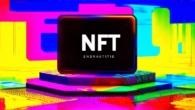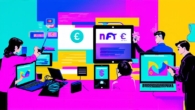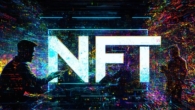
Why does an NFT have value
Non-Fungible Tokens (NFTs) are digital assets that are unique and cannot be exchanged or replaced with another asset of equal value. They have been gaining popularity in recent years as a way to monetize digital content, from art to music and beyond. But what exactly is it about NFTs that gives them value? In this article, we will explore the various factors that contribute to the value of an NFT, including their rarity, uniqueness, and utility.
The rarity factor: A key driver of NFT value
One of the main reasons why NFTs have value is because they are often rare. In the world of art, for example, artists may create only a limited number of prints or other editions of their work, making it highly sought after by collectors.
Similarly, in the world of music, a signed album or concert ticket may be highly valued due to its rarity. Rarity can also be applied to NFTs created in video games and other interactive experiences. For instance, in the popular game “CryptoKitties,” players can breed and collect unique digital cats that have different attributes, making some more valuable than others.
The uniqueness factor: Setting NFTs apart from other assets
Another key factor that contributes to the value of an NFT is its uniqueness. Unlike traditional assets such as stocks or real estate, which can be traded and exchanged in large quantities, NFTs are one-of-a-kind. This means that they cannot be replaced with another asset of equal value, making them highly valuable to collectors and investors.
The utility factor: Putting NFTs to work for you
In addition to their rarity and uniqueness, NFTs also have the potential to provide real-world utility. For example, in the world of art, an NFT can be used to verify the authenticity of a piece or to grant access to exclusive content or events.
In the world of music, an NFT can be used to unlock special perks such as behind-the-scenes access or exclusive merchandise. NFTs can also be used in video games and other interactive experiences to provide players with unique in-game items or benefits.
The power of community: Building value through community support
Finally, the power of community can play a significant role in determining the value of an NFT. When an NFT is created by an artist or other creator who has built a strong following, it can generate significant buzz and excitement among their fans, driving up its value. Similarly, when an NFT is supported by a community of collectors and investors, it can become more valuable over time as demand for it increases.
Case studies: Real-life examples of NFTs in action
Let’s take a look at some real-life examples of how NFTs are being used to create value in different industries.
In the world of art, the famous artist Beeple created an NFT that sold for $69 million at Christie’s auction house in 2021. The NFT represented a digital artwork called “Everydays: The First 5000 Days,” which Beeple had been creating and posting online every day for over five years.
In the world of music, the band Kings of Leon recently created an NFT that sold for $1.5 million on the platform OpenSea. The NFT represented a rare vinyl album signed by the band members, as well as access to exclusive content and merchandise.
In the world of gaming, the popular game CryptoKitties has generated millions in revenue from the sale of its unique digital cats. In fact, one of the rarest cats ever sold on the platform was recently sold for $1 million.
The role of experts: What the experts say about NFTs and value

“NFTs have the potential to transform the way we create, consume, and monetize digital content,” says Chris Gonsalves, CEO of OpenSea, a leading platform for buying and selling NFTs. “Their value is determined by a wide range of factors, including rarity, uniqueness, utility, and community support.”
“NFTs are still in their early stages, but we’re already seeing some incredible use cases,” says Kevin McCoy, co-founder and CEO of Dfinity, a blockchain platform that enables the creation and deployment of NFTs. “From art to music and beyond, NFTs have the potential to revolutionize the way we create and consume digital assets.”
⟨/p⟩
The future of NFTs: Where the value is headed
As the market for NFTs continues to grow, it’s likely that we will see even more creative use cases and innovative ways of generating value through NFTs. Here are some trends and predictions that could shape the future of NFTs and their value.
- Increased adoption by mainstream brands and companies: As NFTs continue to gain traction in the art world, we could see more mainstream brands and companies adopt them as a way to monetize digital content or engage with their customers.
- Greater integration with traditional financial systems: As NFTs become more widely adopted, we could see them integrated with traditional financial systems such as stocks and bonds, allowing for new ways of investing in and trading digital assets.
- The rise of decentralized finance (DeFi): NFTs are already being used in DeFi applications, such as lending and borrowing platforms. As DeFi continues to grow, we could see even more innovative uses for NFTs in this space.
- The emergence of new use cases: As the market for NFTs continues to evolve, we could see new use cases emerge that we can’t even imagine yet. For example, NFTs could be used in the real estate industry to represent unique properties or in the fashion industry to represent rare and exclusive clothing items.
FAQs: Answering common questions about NFTs and value
Q: How do you determine the value of an NFT?
A: The value of an NFT is determined by a wide range of factors, including rarity, uniqueness, utility, and community support.
Q: Can anyone create an NFT?
A: Yes, anyone can create an NFT, but not all NFTs will be valuable or in demand. It’s important to consider the factors that contribute to value when creating an NFT.
Q: How do you buy and sell NFTs?
A: There are a number of platforms and marketplaces where you can buy and sell NFTs, including OpenSea, Rarible, and Christie’s auction house.
Q: Are NFTs subject to tax?
A: Yes, in many countries, NFTs are subject to tax just like other forms of digital assets. It’s important to consult with a tax professional to understand your obligations.
Conclusion: The value of NFTs is here to stay
NFTs have the potential to revolutionize the way we create, consume, and monetize digital content. As the market for NFTs continues to grow, we can expect to see even more innovative uses and new ways of generating value through NFTs. Whether you’re an artist, a collector, or just curious about this exciting new technology, it’s clear that the value of NFTs is here to stay.







